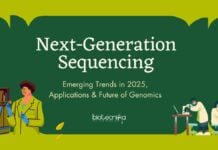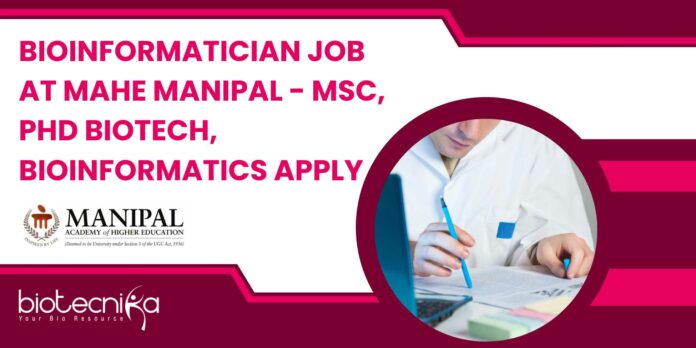Bioinformatician Job at MAHE Manipal – MSc, PhD Biotech, Bioinformatics Apply
Bioinformatician Job at MAHE Manipal – MSc, PhD Biotech, Bioinformatics Apply. MAHE Manipal Bioinformatics, Biotechnology job opening. Interested and eligible applicants can check out all of the details on the same below
This job expires in
Manipal Academy of Higher Education (MAHE), Manipal invites applications following position for the National Institutes of Health (NIH), Maryland, USA funded project titled “Genetic diagnosis of neurodevelopmental disorders in India” at the Department of Medical Genetics, Kasturba Medical College, Manipal.
Role – Bioinformatician
Project title – Genetic diagnosis of neurodevelopmental disorders in India
Duration of the Project: 7 months
How to apply – Candidates possessing the requisite qualification may send their detailed CV on or before August 5, 2023 to the following address. Shortlisted candidates will be
informed by e-mail about the interview date. No TA/DA will be paid for attending the
interview.
Director – HR
Manipal Academy of Higher Education
Madhav Nagar, Manipal 576104
Udupi, Karnataka, India
e-mail: [email protected] | Phone: 0820 -2923433
Qualification – M.Sc. /PhD in Bioinformatics, or M.Sc. (Computer Science) or M.Sc. (Biotechnology) or equivalent qualification with training / experience in bioinformatics related to Human
Genetics.Remuneration – Rs. 46,000/- per month
Check the notification below
Hello friends, we are providing some of the interview questions and answers here that you can expect for the interview for the MSc Biotechnology Bioinformatics Job.
Question: Can you describe your experience with genetic analysis in the context of neurodevelopmental disorders? Answer: Certainly. During my academic and professional journey, I have extensively worked on various bioinformatics tools and databases to analyze genomic data related to neurodevelopmental disorders. I have applied my expertise in identifying potential genetic variants, studying their functional implications, and associating them with specific clinical phenotypes. I have also collaborated with geneticists and clinicians to interpret the results accurately and contribute to the diagnosis of these disorders.
Question: How do you handle large-scale genomic datasets, and what tools do you typically use for data analysis? Answer: Dealing with large-scale genomic datasets requires a systematic approach. I prefer using programming languages such as Python and R for data manipulation and analysis. Additionally, I’m well-versed in bioinformatics tools like GATK, ANNOVAR, and Variant Effect Predictor (VEP) for variant calling, annotation, and interpretation. Utilizing cloud-based platforms and high-performance computing clusters has also been part of my workflow to handle the computational demands of large datasets effectively.
Question: How do you stay up-to-date with the latest advancements and developments in bioinformatics and human genetics? Answer: Continuous learning is essential in the rapidly evolving field of bioinformatics and human genetics. I regularly attend conferences, workshops, and webinars related to genetics and bioinformatics. Subscribing to relevant scientific journals and joining professional associations also helps me stay updated with cutting-edge research and developments in the field. Moreover, engaging in online forums and communities enables me to discuss and exchange knowledge with fellow experts.
Question: In this project, you will be working with a team of researchers, geneticists, and clinicians. Can you describe your experience collaborating with interdisciplinary teams? Answer: Collaboration with interdisciplinary teams has been a significant aspect of my previous roles. I understand the importance of effective communication and teamwork when working with researchers, geneticists, and clinicians from diverse backgrounds. In my experience, I have contributed my bioinformatics expertise to support genetic studies, actively participated in discussions, and translated genomic findings into understandable terms for non-bioinformatic collaborators. I am adaptable and value the input of all team members in achieving project objectives.
Question: The role may involve analyzing data from diverse populations, including Indian cohorts. How do you address challenges related to genetic diversity and population-specific genetic variants? Answer: Genetic diversity in populations is indeed a critical factor in genomic analysis. To address this, I ensure that the reference genome and variant databases I use are relevant to the specific population under investigation, which, in this case, would be Indian cohorts. This involves using population-specific variant databases and allele frequencies to improve the accuracy of variant calling and interpretation. Additionally, I am experienced in implementing statistical methods that consider population stratification when performing association studies to avoid confounding factors and provide more reliable results.
Editor’s Note: Bioinformatician Job at MAHE Manipal – MSc, PhD Biotech, Bioinformatics Apply. Please ensure you are subscribed to the Biotecnika Times Newsletter and our YouTube channel to be notified of the latest industry news. Follow us on social media like Twitter, Telegram, Facebook




































